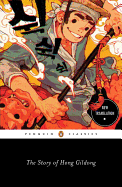
Whether The Story of Hong Gildong is the oldest extant Korean prose fiction or the second oldest, whether it was written by poet and statesman Heo Gyun (1569-1618) about a real bandit or whether it's popular fiction by an anonymous commoner in the second half of the 19th century matters greatly to some. Not so much to the lucky English-language reader who comes upon Minsoo Kang's exciting new translation of this ancient story, now available from Penguin Classics.
About the length of The Epic of Gilgamesh, this little 77-page classic of the pre-Korean Kingdom of Joseon is the account of a high minister's son who, because he is born of his father's concubine, is "not allowed to address [his] own father as Father and [his] older brother as Brother." This is the famous, often-quoted lament for which Gildong is known in Korean culture. The sons of secondary wives had access to wealth and education, but no legal standing in society and were not accorded the rights of nobility.
The fast-paced, plot-driven narrative is fueled by scenes of exciting action alternating with scenes of high emotion. As Korea has been historically conquered and colonized, Gildong's recovery of dignity and respect has a national echo that has made it persistently popular. As a secondary son who is "disrespected, unappreciated and underrated," attempting to overcome the disadvantages of his birth to prove his true worth as a leader of his people, Hong Gildong is the embodiment of an oppressed and underestimated Korea. --Nick DiMartino, Nick's Picks, University Book Store, Seattle, Wash.

